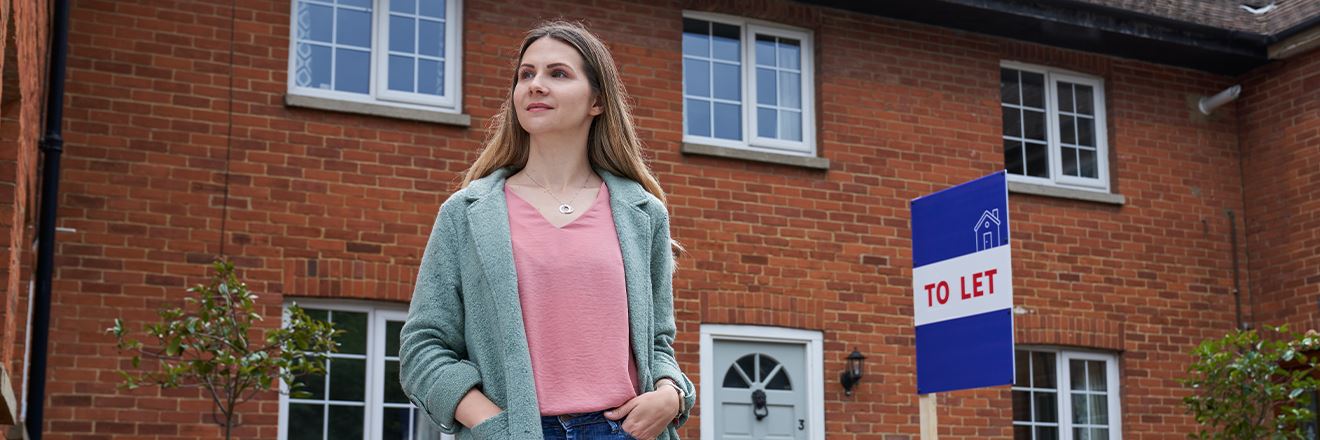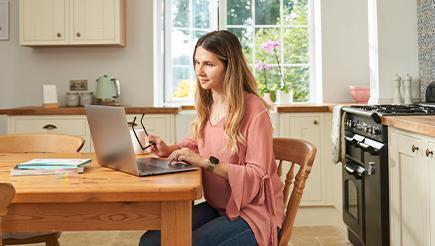Being a good landlord isn’t always easy. It takes time and dedication, especially if you manage the property yourself.
To find out what work goes in to being a good landlord, we asked Andreea Plant – AXA customer and landlord for the last four years – for her tips and what advice she’d give to other landlords who are just starting out.
Why did you decide to become a landlord in the first place?
It’s something we had been planning for a number of years before we managed to acquire our first property. It was a conscious decision that involved quite a lot of planning and budgeting. You have to get all the money together first before you make the decision to become a landlord.
The security of having additional income from a property when we we’re older just seemed like a less risky option than investing in other opportunities or else just having the money sitting in a pension fund. It seemed a better investment for us to invest in bricks and mortar.
What’s the biggest challenge you’re facing as a landlord right now?
Time. You have to dedicate time to being a landlord. And you also have to be aware that anything can happen at any time. So it doesn’t matter if you’re on holiday or if you’re on annual leave from your day job, if an issue arises from your rental property you have to be able to deal with it. It’s a time commitment and you have to be willing to dedicate time to your tenants.
Do you think it’s getting more difficult to be a landlord nowadays?
I would say so. Because of the constant changes in legislation, regulations, tax changes, changes in people’s mindsets and tenants’ attitudes towards renting, it seems like the divide between tenant and landlord is getting bigger. There’s this chasm between the two which I don’t think was there so much in the past, so I’m trying to bridge that chasm one property at a time and one landlord/tenant relationship at a time.
There’s a lot of rules and regulations around being a landlord. How do you keep up to speed with legislation?
I’ve got a lot of experience because I’ve worked in the property industry in the past, but I also attend landlord events and forums, and I’ve undertaken training to become an accredited landlord as well. You have to keep an eye on Government releases and announcements. You can’t just learn it once and then forget about it. It’s something you have to constantly keep up with because every month there can be new guidance or small tweaks that can make a big difference.
I do a lot of CPD hours, I attend conferences so that I can be confident about the work that I’m doing as a landlord, and that I’m doing the right thing all the time.
With things like landlord accreditation, do you think that helps make you a better landlord?
The more knowledge you have the better decisions you can make and the more informed you can be. You can overcome a lot of issues in the future because you’ve got that information now, so you can plan better.
Becoming an accredited landlord is optional but it’s something I chose to do because I manage my own properties. So I thought it was vital to have something that would show that I know what I’m doing. It also gives confidence to my tenants that I’m not a new landlord that doesn’t know anything or that I’m just going to sell the property in a few years – it shows that I’m a professional landlord. That I chose to do this and I’m doing it well.
You manage your properties yourself rather than through a letting agent. Why did you decide to go down that route?
Having first-hand experience in the property industry meant I felt confident that I was able to do it myself, without a letting agent. And as well as that I wanted to have that personal relationship with my tenants. To be able to build on that has been great because we’ve got tenants that we’ve had for years and years. We’ve built a relationship and that’s been beneficial all round, for the tenants and for me.
Not using an agent means I’m always in contact with the tenants, I know what’s happening with the property and what the condition is. There’s no middleman. I know the quality of the work I put in. Plus, we’re local and we’ve only chosen to buy properties that are in a half hour radius of us, so we can attend quickly if anything happens. But if you’re a landlord who’s not local to your property, then using an agent would be better in case of any emergency.
Do you find it difficult managing the properties yourself? What are the challenges?
If it’s a secondary thing to you on top of your day job then it’d probably be easier to use an agent rather than putting in the work yourself. For myself the biggest challenge is getting the balance right, between being friendly with your tenants and being too involved. You have to give them their space and allow them to enjoy the property with some peace and quiet. When you manage a property yourself you need to get the balance right, because your tenants could become overly reliant on you. They’ve got your phone number and they know you, you have a personal relationship, so they could call you for things they might not contact an agent about.
But I feel it’s more rewarding managing the properties myself. When you do it right and you’ve got happy tenants that have been with you for years and now they’re buying their own place and you’ve built a relationship with them, that is very very rewarding. You get a great sense of achievement. Similarly, when you’re letting out a property and you see people lining up for viewings. You’ve potentially refurbished the property, decorated it and brought it up to spec, and now you have people coming in complimenting you on how the house looks after you’ve put that effort in. It does fill you with a sense of pride.
What do you think makes a good landlord?
It’s so important to try to be a good landlord. You need to treat your tenants right. I think a good landlord knows their limitations. If you can’t be a hands-on landlord you have to let your tenants know and you should probably use an agent. Knowing your limitations is crucial to figuring out what kind of landlord you can be.
And then being honest about the property, being honest about your expectations from your tenant is crucial. That then sets the terms for the rest of your relationship with them throughout the tenancy. You have to be fair and transparent in what you do, make it clear what you want from being a landlord. Is it a long-term investment or a short-term investment, is it a property you plan on selling in a couple of years… letting your tenants know this in advance as well helps set expectations and helps build the landlord/tenant relationship.
What tips or advice would you give to people who are just starting out as landlords or people or are thinking of letting out a property?
Do the research. Speak to an existing landlord and see exactly how much time they have to dedicate to it. Make sure they know it’s not something that you can just rent out and forget about and have the money coming in – that’s often not the case. Do your research beforehand and make sure you know exactly what’s involved.
Look online and try to join a landlord group or a forum. There’s various membership schemes out there. They’re able to give advice and if you find yourself in a situation where you don’t know what’s best or what to do then it’s good if you have that support there. Ask for their advice and rely on their advice.
Is there anywhere you go for advice on being a landlord?
I’m a member of the National Landlords Association. So you pay a yearly membership and if you ever have problems they can give you advice and guide you on what they currently think is the best way forward. It’s good to have that safety net there in case you ever need it.
How do you choose the right tenant for your property?
I like to meet them at the viewing. You get a feel for the person face to face that you don’t get on paper. You could realise that your personalities might clash or that they’re not the right people for the property. But you get a better feel for them after meeting face to face.
And then references. References are crucial. Speak to their current landlord to get a reference from them and possibly a previous landlord too if you can. If in doubt I’ll ask for a second reference, even a character reference. And then I always ask for credit checks on all tenants and make it quite clear to them that it’s something that’s mandatory for a tenancy. They can tell me in advance if they feel they wouldn’t pass a credit check or if their credit score is low. But you know you’re onto a good tenant if they’re happy with all of that and they’re happy to accept the terms of the tenancy that you’ve laid out.
Why do you think insurance is a valuable thing for a landlord to have?
Firstly, being able to know that your property is covered is reassuring. AXA has the loss of rent insurance option as well which is brilliant, because you can rest assured that if anything horrible happened and the property was uninhabitable, you’d be protected from any loss of income. That safety net and peace of mind is crucial. I personally wouldn’t be a landlord without landlord insurance in place.
And secondly, many mortgage lenders will make it a condition that you have to have the correct levels of insurance in place before you can get a buy to let mortgage. Having just home insurance may not be the right insurance, so having the specific tailored landlord insurance makes me confident that I’ve got the right cover for my properties and without it I could be in breach of my mortgage contract for some companies.
You can find out the difference between landlord insurance and home insurance – and which is right for you – in our guide here


